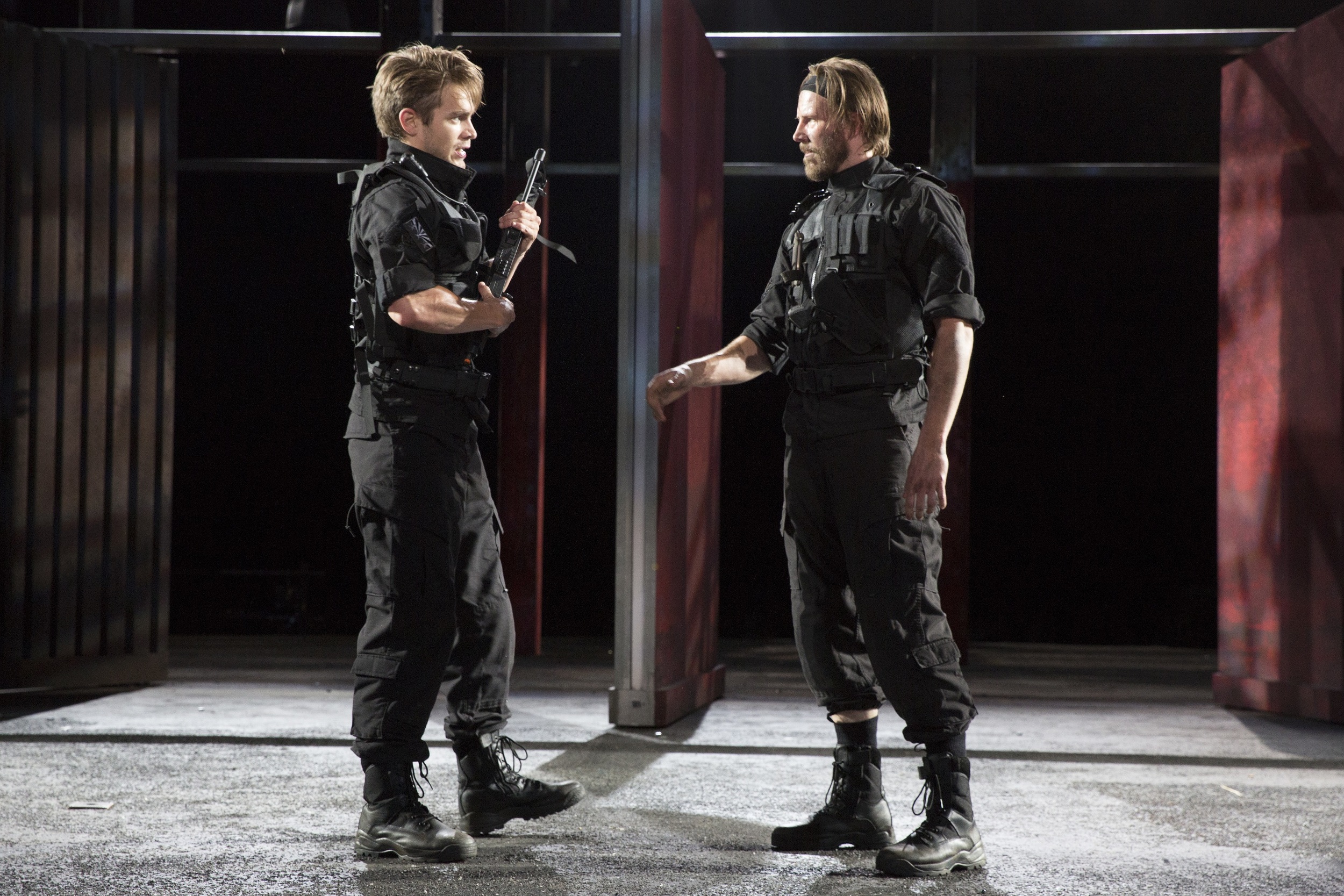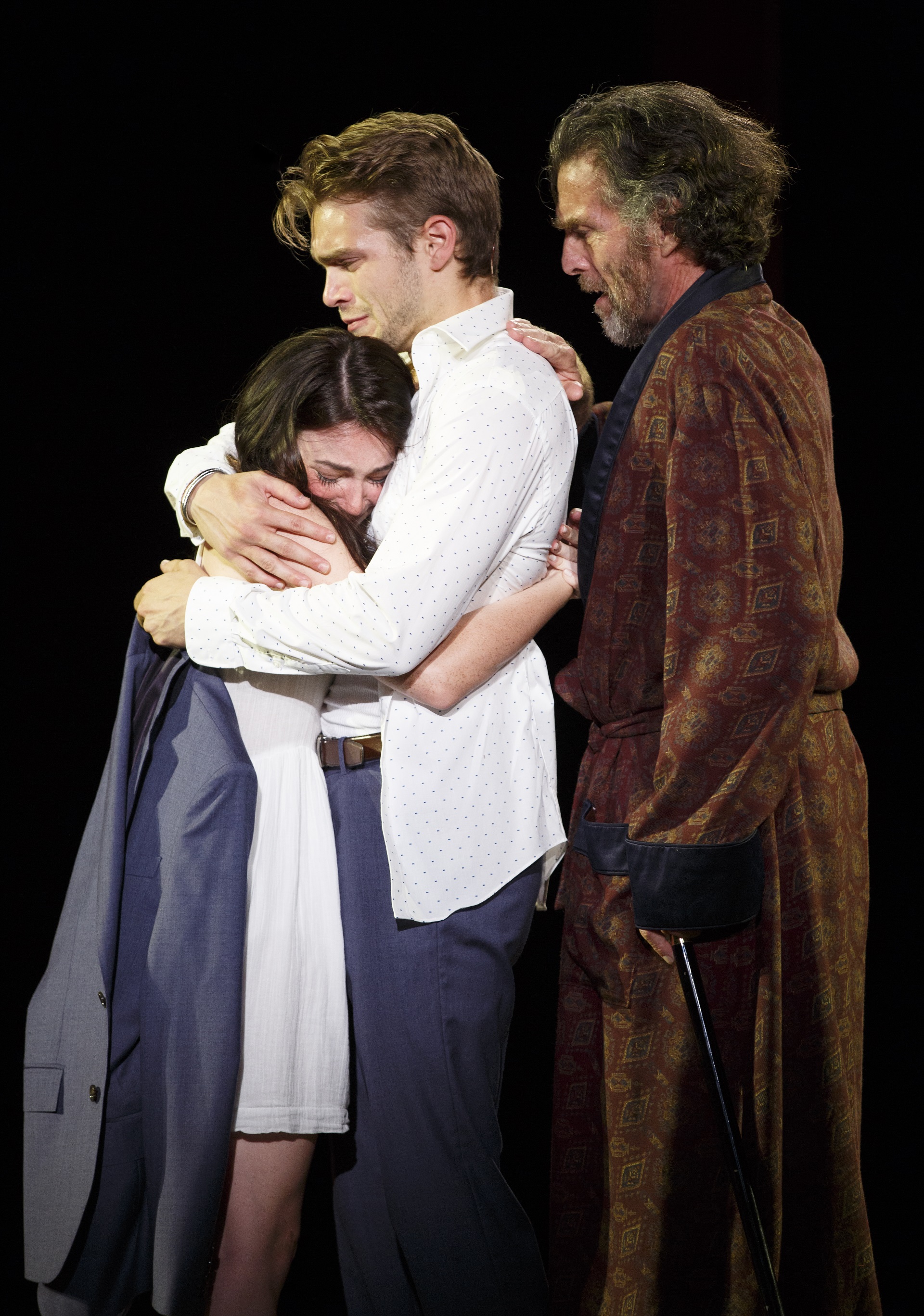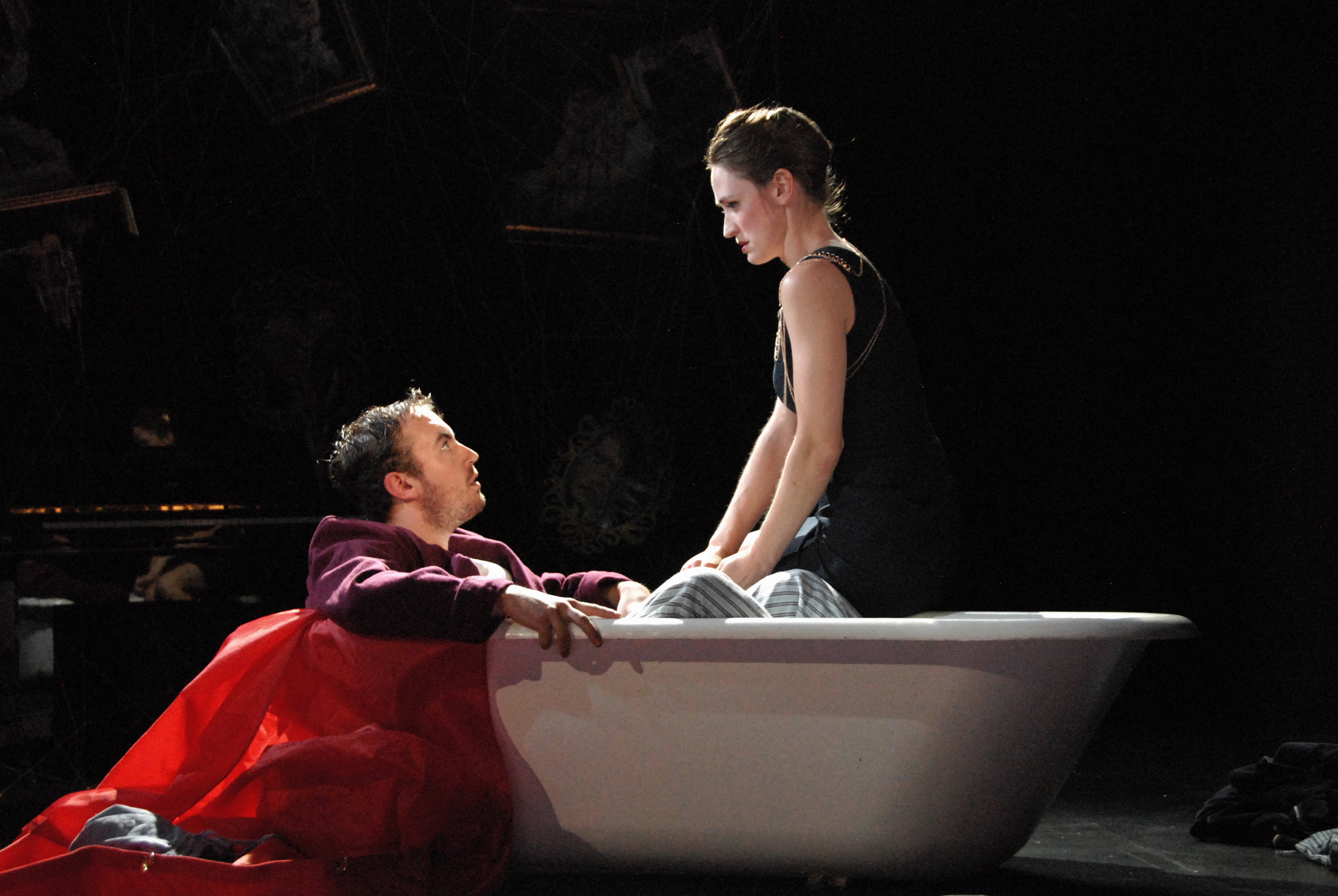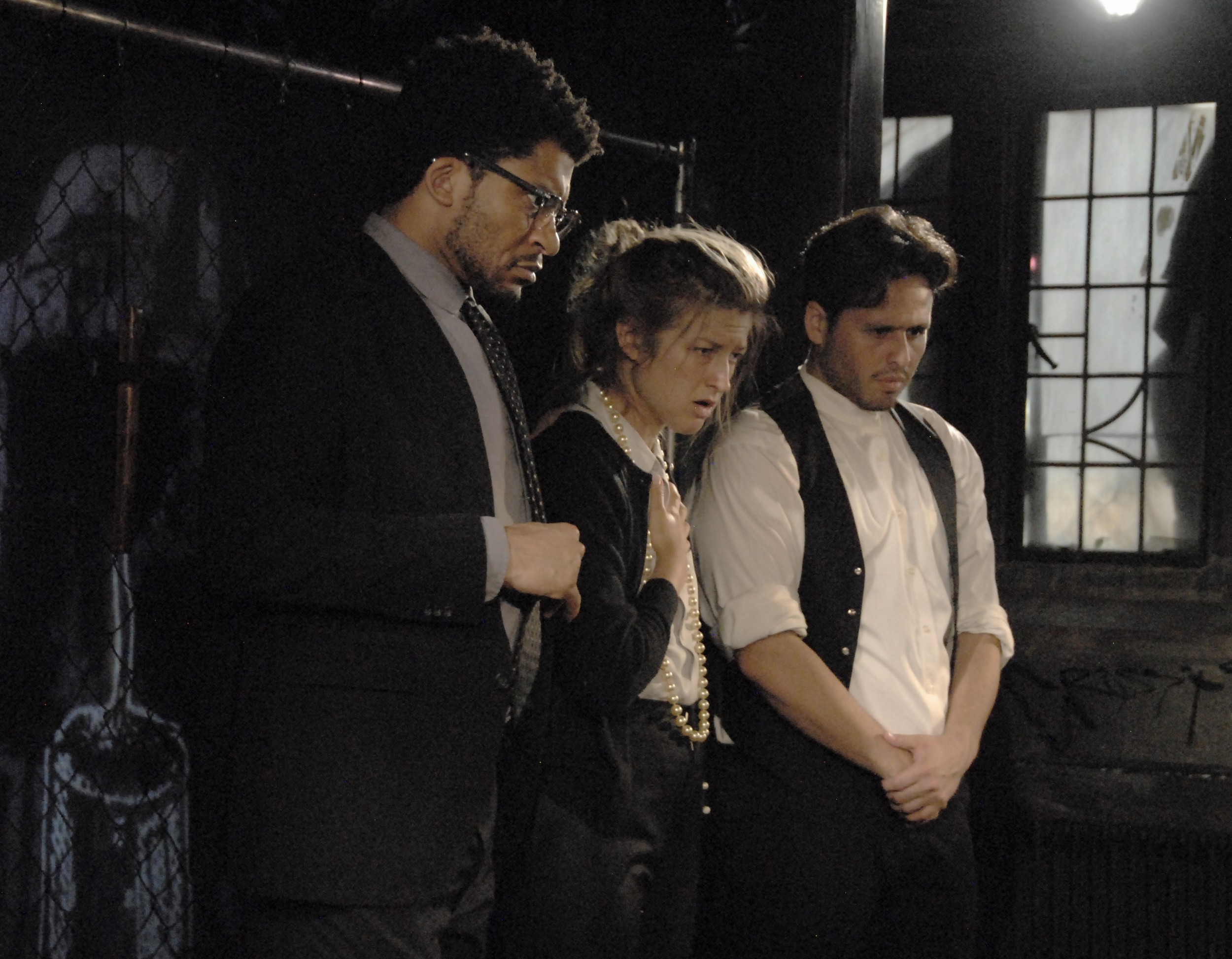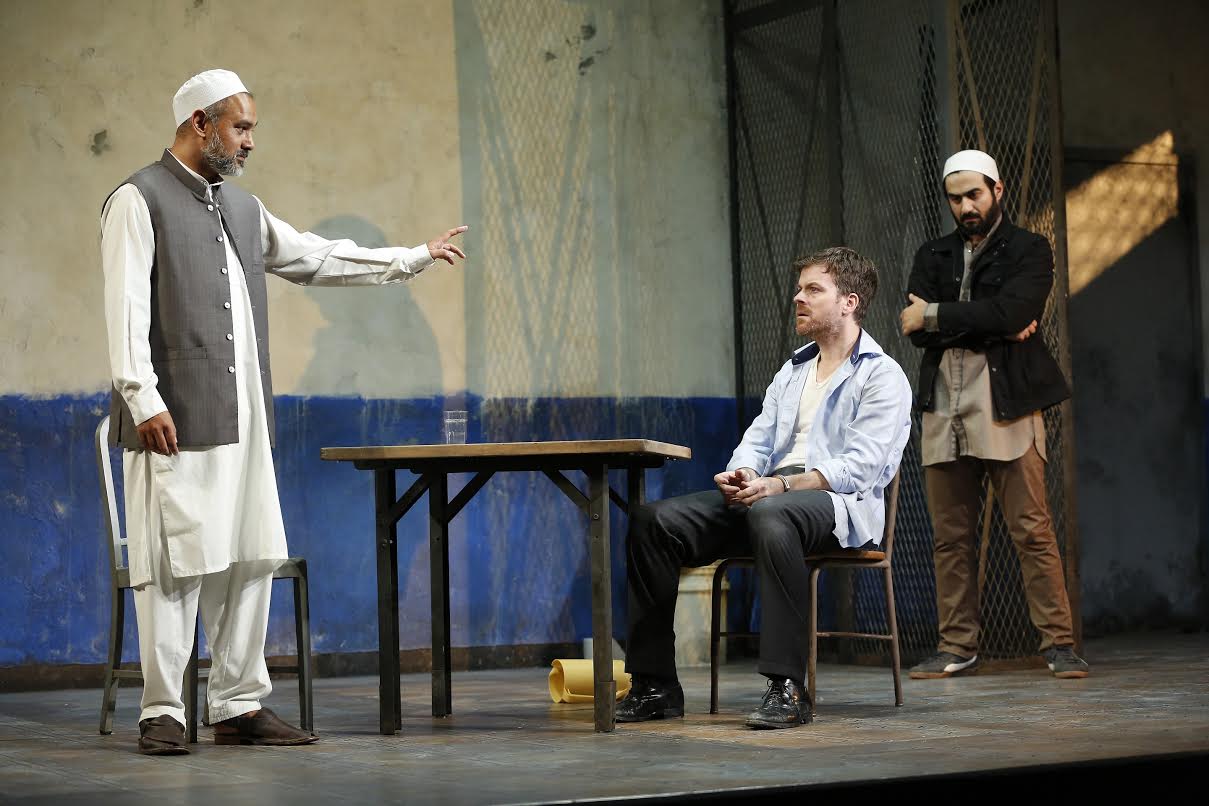Review of Camelot, Westport Country Playhouse
I don’t think of myself as a sentimental type, but something about the story of King Arthur gets to me. That may be because it’s a story that almost defines “romance.” Set in the legendary kingdom that supposedly created chivalry, Lerner and Loewe’s Camelot shows us Arthur as the epitome of a principled leader. A boy who becomes king—in the version of the story made popular in T.H. White’s The Once and Future King, the novel that serves as the basis for the musical—because of his virtues and valor, as decided by the test of the sword in the stone.
Guenevere (Britney Coleman), Arthur (Robert Sean Leonard) (photo: Carol Rosegg)
The story also contains the love affair between Arthur’s best knight, Lancelot du Lac, first introduced into the Arthurian tales by Chrétien de Troyes in the 12th century, and Lady Guinevere, Arthur’s queen. That element of the story is what makes Camelot—if not a tragedy—a touching tale of rise and fall. Nostalgia for a Golden Age is perennial, and of old. Camelot, as conceived by modern treatments of Arthurian legend, seems a feudal utopia, a world led by a first among equals, of great hearts and good deeds. The point, of course, is that legendary Arthur is remembered because he was able, for a time, to curb the usual greed and viciousness of warriors, making their “might serve right” as dedicated knights of his Round Table. Lerner and Loewe brilliantly integrate this merry and melancholy tale into the modern musical, and Mark Lamos’ lyrical and rousing version at the Westport Country Playhouse does David Lee’s more spare adaptation of the work full justice.
Start with Robert Sean Leonard as Arthur. Some notable actors have assayed this role—Richard Burton, Richard Harris among them—so we can assume it has some attraction. Here, it’s easy to see why. Leonard shows us that acting can be, first and foremost, the task of finding a voice for a character. His rolls and dips, riding a tone that feels grand and humble at the same time. It’s a marvel. He portrays Arthur as affable and kind, a bit absent-minded like a retiring elder statesman, and cautious like a man of war unable to fathom what it’s like to win a queen—“I Wonder What the King is Doing Tonight.” But Leonard’s boyish good looks, into his late 40s, make him an excellent choice for the role, and he handles “How to Handle a Woman” with requisite tenderness.
Arthur (Robert Sean Leonard), Guenevere (Britney Coleman) (photo: Carol Rosegg)
Arthur’s rapport with his Guenevere, Britney Coleman, seems one of mutual admiration, and his championing of the headstrong Lancelot (Stephen Mark Lukas), even after he has reasons to suspect the pair’s fidelity to him, adds a chastened air to Arthur that Leonard wears well. It’s an affecting grasp of a character who comes to us now as an even more legendary ideal in a time when pure and selfless leaders seem fewer than ever. Leonard’s rendering of the title song feels almost off-the-cuff, finding inspiration as he warms to the theme.
For all that, Arthur is not the prime singing role here. That falls to the lovely and graceful Guenevere, given a subtly modern rendering by Coleman, whose command of an array of moods scores throughout the show, with fun romps like “Then You May Take Me to the Fair” and “Lusty Month of May,” as well as romantic ballads like “Before I Gaze at You Again,” and more musingly in “Simple Joys of Maidenhood” and, with Leonard, “What Do the Simple Folk Do.” She’s a commanding First Lady indeed, and the affair with Lancelot, beginning with haughty taunting, grows by the end of Act I into mutual ardor. It all seems fated, and Coleman makes Guenevere not simply a prize between men but a full heart won by both.
Guenevere (Britney Coleman), Lancelot (Stephen Mark Lukas) (photo: Carol Rosegg)
Stephen Mark Lukas delivers the prime part of Lancelot; he begins as a conceited newcomer with “C’est Moi”—and Lukas plays the comic aspect of the overzealous knight well—but he’s also clearly heart-throb material and shows off a fluid baritone for Act II’s high-romantic opener “If Ever I Would Leave You.” Lest we think the show is going to be all about a romantic triangle, a villain—Mordred, played with scheming brio by Patrick Andrews—arrives in Act II to bring about the events that end the dream of Camelot. He wins over Arthur’s knights (Michael De Souza, Mike Evariste, Brian Owen, Jon-Michael Reese) with “Seven Deadly Virtues,” a clever song that plays to the open cunning of political battle. A word too for charming Sana Sarr as the boy playing with his knight figurines and as Tom of Warwick, who, knighted, receives his king’s hopes for a future.
Arthur (Robert Sean Leonard), Tom (Sana Sarr) (photo: Carol Rosegg)
The staging, with the oh-so-graceful scenic design by Michael Yeargan and sound design by Robert Wierzel, and Domonic Sack’s superb sound and Wade Laboissonniere’s sumptuous costumes (what can I say, I have a thing for capes), makes this Camelot a pleasure throughout. Granted, it’s very much a male-heavy cast and one could wish for a few more damsels to celebrate the lusty month of May, and a bit more skirmishing to give us a sense of the desperate rescue of Guenevere, but keeping the cast size and effects economical makes sense and makes for a swift and sure evening for celebrating tarnished ideals.
The cast of Camelot as Revelers (photo: Carol Rosegg)
Throughout, the songs are the strength of this show, proving again that the team of Lerner and Loewe were for the ages, and Lee’s new book and Steve Orich’s new orchestrations make the show swift-moving and free of bombast.
See Westport’s Camelot if only to renew some of your faith in human ideals. God knows we need heroes now.
Camelot
Book and Lyrics by Alan Jay Lerner
Music by Frederick Loewe
Original production directed and staged by Moss Hart
Based on The Once and Future King by T. H. White
Book adapted by David Lee
New orchestrations by Steve Orich
Directed by MarkLamos
Choreographed by Connor Gallagher
Scenic Design: Michael Yeargan; Costume Design: Wade Laboissonniere; Lighting Design: Robert Wierzel; Sound Design: Domonic Sack; Dialect Coach: Shane Ann Younts; Fight Director: Michael Rossmy; Music Director: Wayne Barker; Props Master: Karin White; Casting: Tara Rubin Casting; Production Stage Manager: Frank Lombardi
Cast: Patrick Andrews, Britney Coleman, Michael De Souza, Mike Evariste, Robert Sean Leonard, Stephen Mark Lukas, Brian Owen, Jon-Michael Reese, Sana Sarr
Orchestra: Wayne Barker, piano; Angela Marroy Boerger, violin; Alan Brady, reeds; Simon Hutchings, reeds; Deane Prouty, percussion; Joseph Russo, string bass; Fred Rose, cello; Marshall Sealy, French horn
Westport Country Playhouse
October 4-30, 2016; extended to November 5







































